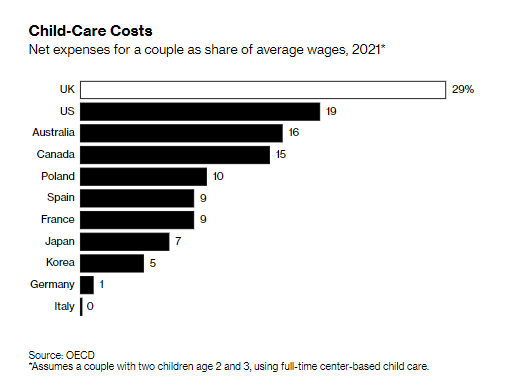Children’s charity Coram published its annual Childcare Survey today. The report points to significant childcare shortages, with children from disadvantaged areas missing out the most. Only half of all local areas have sufficient childcare places for under two-year-olds, down seven per cent from last year. Only 48 per cent of local authorities have enough places for full-time parents, 11 per cent less than last year. The report also highlights the rise in childcare costs. Up 5.6 per cent from last year, 25 hours of childcare for a child under two now cost nearly £150 per week. The high cost and lack of availability have made many women question whether to return to work.
Overall, the figures indicate that childcare shortages impact parents from disadvantaged areas the most. Moreover, 43% of UK local authorities reported that many local providers have had to reduce the number of funded early education entitlement spots. Six per cent fewer local authorities could offer the universal 15-hour early education entitlement for three and four-year-olds, leaving many parents bereft of this income boost.
The cost of living crisis has forced many providers to lay off staff and reduce opening hours.
Speaking at the publication of the report, Coram Head Megan Jarvie said:
“The need for reform of the childcare system is urgent. As well as eye-watering bills, parents are facing widening gaps in availability of the childcare they need. As the Chancellor decides his budget, we urge him to recognise the value of investing in childcare – it is a wise investment, enabling parents to work and boosting the outcomes of young children.”
With a week to go before Jeremy Hunt reveals his budget, Coram urges the government to streamline the childcare system, prioritising quality, universal availability, and costs parents can afford.
Childcare shortages cost the UK £27 billion per year
According to a Centre for Progressive Policy (CPP) study, the lack of accessible and affordable childcare places costs the UK £27 billion annually. The same research suggests that mothers miss £9.4 billion in wages. 1.5 million women told researchers they would work longer hours if childcare places were available, and nearly half a million said they had quit work altogether because of childcare issues.
The CCP welcome the government’s December decision to classify childcare facilities as vital infrastructure, potentially allowing local authorities to force housing developers to contribute toward the costs.
At the time, the CCP also suggested the government borrow against returns from taxes received when mothers returned to work. These borrowings could increase investment in the sector. Rosie Fogden said on behalf of the CPP:
“Childcare is infrastructure: it allows people to go to work, access better skills and earnings, and contribute to the economy.”
Labour wants to overhaul the free childcare system
The opposition wants to overhaul the UK’s free childcare system. Ahead of next week’s budget, the party has warned that parents are vulnerable to ever-rising costs.
Labour’s education spokesperson Bridget Phillipson will say today that price increases by childcare providers are due to the government’s failure to fund adequate childcare. The party is setting out its stall ahead of the budget, announcing that Labour wants to create “a modern childcare system.”
According to an email seen by Bloomberg, Labour will promise to introduce a range of supports for parents from parental leave to the end of primary school.
In response to the Coram report, Phillipson will point out that the hourly cost of childcare for under two-year-olds has risen by 14 per cent since 2018. On 30 hours of childcare for an under two, parents spend £800 more than they did in 2017.
“The child care model, the Conservatives have built fails everyone, denying parents the ability to work the jobs they’d like, to give their children the opportunities they’d like, and is not of the quality that staff want to provide,” Phillipson is expected to say later today.
Highlighting the £20 billion spent on childcare over the last five years, a Department of Education spokesperson said:
“We recognise that families and early years providers across the country are facing financial pressures.”
For its part, the Institute for Fiscal Studies said that rising costs had already wiped out any funding increases to providers. The body also pointed out that the system’s complexity makes it difficult for parents to work out their entitlements, while reforms are also difficult to introduce.




